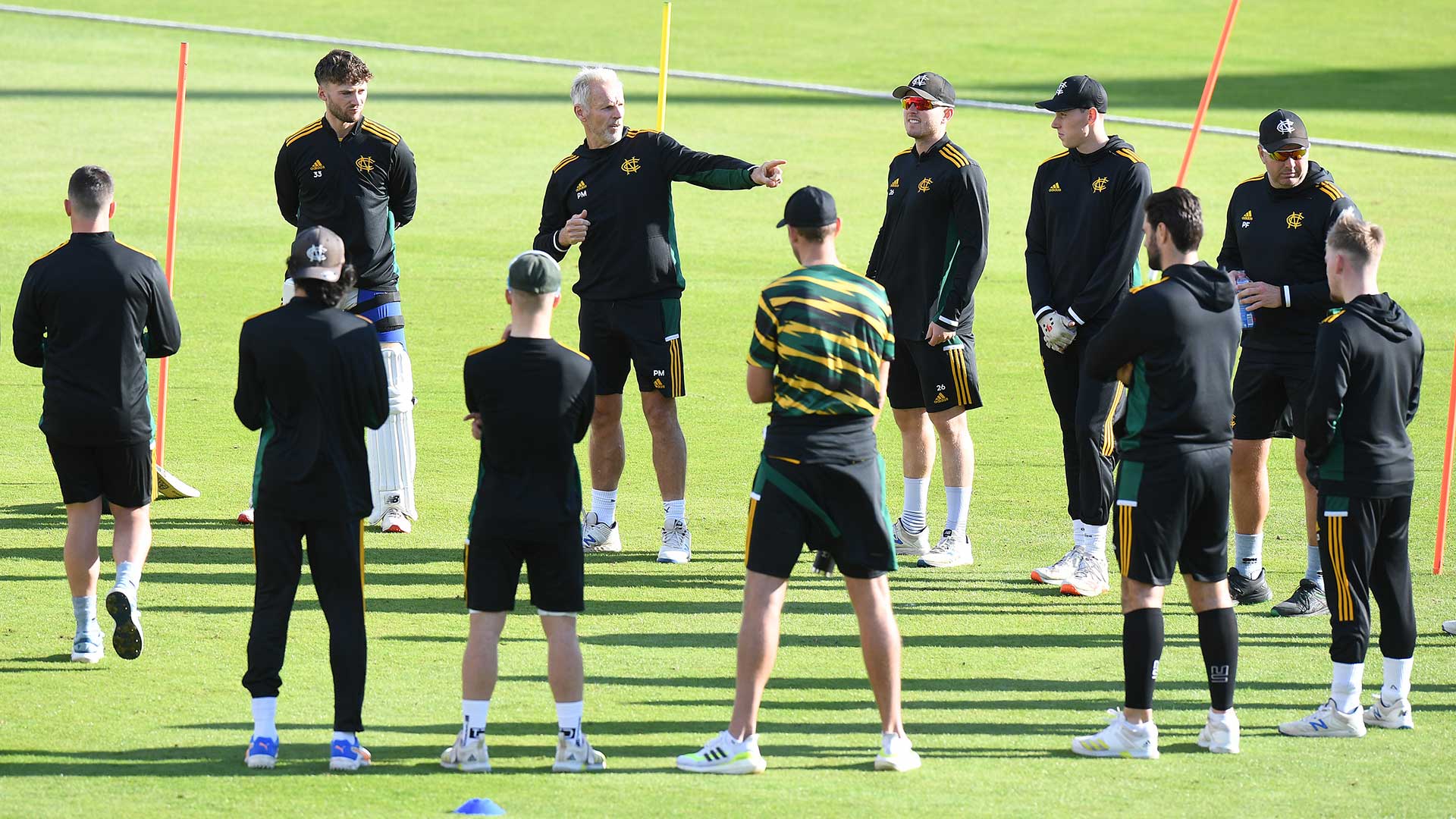Over the course of a half-hour discussion with Chris Marshall, Nottinghamshire’s Sport Psychologist, one key message prevails like the swash of south-coast sea by which he finds himself.
The Green and Golds are readying themselves for their first County Championship fixture of the year against Sussex, a moment nearly six months in the making; meanwhile Marshall is reflecting on his winter’s work.
“As a coaching group we run a philosophy where we want players to bring the best versions of themselves each and every day,” he says.
“One of the things we do really well at this club, which is facilitated by our coaching staff, is embracing individuality.
“We have clear parameters, and expectations of how we go about performing but, ultimately, everyone is different and we love that about our group.
“We don’t expect people to try and be something they are not. As soon as you are comfortable being at work, you get the best out of players and staff and a key part of my role is to build on players' strengths in order to help them flourish.”
In an effort to ensure the squad are primed to perform at their peak, Marshall splits his work in the off-season into three layers - individual, team and systemic. Like the blocks of pre-season themselves, these layers are then split into exploration, refinement and performance stages.
Individual work refers to how players can appropriately cope with the demands placed upon them. That ranges from mechanisms to handle pressure to how they can overcome the challenges presented by ‘bubble life’, an ongoing consequence of the Covid pandemic.
Marshall provides a toolkit, in essence; proactive approaches to dealing with pressure. His job is made easier by the willingness of the players to develop.
“Like the lads have a batting coach to call on, it's no different in my world; it's a far cry from just helping players fix problems,” he explains.
“I feel really lucky we have got a group of boys who are really open to wanting to explore stuff. They are really curious, and want to get better.
“A lot of the mental skills stuff we did before Christmas in the explore phase wouldn’t have been new to the boys. But we have to ask ourselves whether we can become more knowledgeable and get better.
“Luke Fletcher told an amazing story about how he visualises and what his process is. When he talks about it, you get some of the younger lads going ‘yeah, actually, this is something that is really important’.
“Some of the work we did this winter was very player-led because of their prior knowledge, but that is far more effective at times, and that tells us where we are as a club.”
At core of Marshall’s philosophy for individual performance is the requirement for players to stay ‘in the moment’.
“Performance anxiety lives when we are thinking too much into the future and what could happen, or we are dwelling on the past and what has happened. It is impossible to be anxious if we remain in contact with the present moment.” Chris Marshall
It’s a phrase which may wash over ears at first hearing, such is its common usage.
However, he explains that failure to focus on ‘the now’ can be a debilitating hindrance.
“Performance anxiety lives when we are thinking too much into the future and what could happen, or we are dwelling on the past and what has happened. It is impossible to be anxious if we remain in contact with the present moment.
“Everything we do is geared towards helping players stay in that moment for as long as possible. Of course, you can’t do that for the whole period of time, and I want players to think about what might be coming up in order to effectively plan for it, but we split our thoughts into being helpful or unhelpful.
“Players need to ask themselves: ‘Is the direction my thoughts are taking me at the moment helping me perform?’”
This kind of introspective analysis can be undervalued in the domestic game, Marshall claims. American sports, and individual sports in this country, have a focus on psychological development being as important as other areas, yet cricket can lag behind.
With the fine margins of elite sport, an optimal psychological state may just be the difference between success and failure.
Equally important is the togetherness of the squad. There is no one stop shop to create an environment in which every member feels they have a voice, and are challenged by, yet comfortable with, what is being asked of them.
Rather it is an environment cultivated over a period of time; the product of overcoming challenges.

Notts had no shortage of misfortune during a barren red ball spell prior to 2021’s upturn in form, yet the Green and Golds are better for it.
Team building trips, meanwhile, such as Notts’ one night escape to the Lake District, help the team to grow together and learn more about one another.
“A big part of that trip was just having a good craic together. First and foremost, we are coming out of a really difficult couple of years with the pandemic, and spending time together, just us, as a group, is really important.
“Secondly, I feel it is important that the boys have elements of shared hardship in a context which is completely different to cricket. There might be someone that you completely don’t expect to possess a certain skill set who pulls it out the bag.
“We went canyoning where you are jumping in and out of freezing water, and we had a couple of non-swimmers and they were being supported by teammates.
“They learned stuff about themselves that they didn’t know they were capable of, and the people who were helping were learning about the way they might communicate or cajole.
“Those lessons are applicable on a cricket field just as much as they are in a freezing cold gorge. When the lads get the crossover, which most of them do, it is another experience which creates a sense of togetherness within the group.”
It is crucial that Marshall’s systemic approach - the culture, environment and legacy of the current crop - is endorsed by those at the helm.
“I can absolutely see why players want to play for pete and all the coaches. They are a big reason why I enjoy working for the here, because we all want to help people get better, and the players value the support they get.” Chris Marshall
The wider coaching group can then create a functional, psychologically informed environment conducive to growth.
It starts with Head Coach Peter Moores, who Marshall first met when they worked together at England in 2014.
“To work with him, as a psychologist, is absolutely brilliant, because he challenges us, he tests us, I swear he knows more than me about psychology, and he provides an environment where everyone wants to get better,” he says.
“I can absolutely see why players want to play for pete and all the coaches. They are a big reason why I enjoy working for the here, because we all want to help people get better, and the players value the support they get. We want to do it for them.
Cearly, it is hoped that the outcome of Marshall’s work, along with that of the physiological, technical and tactical developments made in the winter, is silverware.
Notts will “not shy away” from their ambitions to achieve promotion in the County Championship, a goal which will be worked towards on a game by game, session by session basis.
Yet pleasure arrives in many forms. For Marshall, celebrating success is crucial. It is the fabric of a positive environment. Yet that needn’t just be at the end of a four day, one day or 20 over win.
“I get really excited when I see Hass [Haseeb Hameed] score 100, Liam Patterson-White take five wickets, Clarkey [Joe Clarke] and Ducky [Ben Duckett] play franchise cricket, or Sammy King make his List A debut,” he concludes.
“It is about young people achieving their ambitions. That is why we do what we do.”
